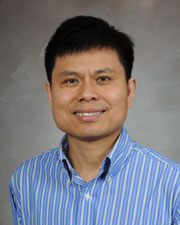Biography
Dr. Ziyin Li received his Ph.D. degree in molecular genetics from the Institute of Genetics, Chinese Academy of Sciences in Beijing, working on plant stress responses. He did his postdoctoral training in the laboratory of Prof. C.C. Wang at the University of California, San Francisco, working on the ubiquitin-proteasome system in Trypanosoma brucei, a unicellular eukaryote and a human parasite. During his postdoc period, Dr. Li initiated the cell cycle control project aiming to dissect the unusual mechanisms of mitosis and cytokinesis in this early branching eukaryote.
Dr. Li joined the Department of Microbiology and Molecular Genetics, University of Texas Health Science Center at Houston as an assistant professor in 2009, and currently holds a professor position. He is also a faculty member of the MD Anderson UTHealth Graduate School of Biomedical Sciences and an adjunct faculty member of the National School of Tropical Medicine at Baylor College of Medicine.
Dr. Li is a recipient of the University of Texas System Faculty STAR award.
Education
- Postdoctoral Fellow
- University of California-San Francisco
- Ph.D.
- Institute of Genetics, Chinese Academy of Sciences
Areas of Interest
Research Interests
Cell cycle regulation in trypanosomes
My laboratory is mainly interested in understanding the molecular mechanism of mitosis and cytokinesis. We use Trypanosoma brucei, a unicellular eukaryote and the causative agent of human sleeping sickness, as a model organism to address the fundamental questions of how mitosis and cytokinesis are regulated and coordinated during cell division. The current focus is on the cell cycle regulatory pathways consisting of protein kinases such as Aurora B kinase, Polo-like kinase and Tousled-like kinase, spindle-associated motor proteins, and ubiquitin ligases.
We are also interested in the role of ubiquitin-dependent and -independent proteolysis in various cell biological processes. ATP-dependent protease complexes are present in all three kingdoms of life where they ride the cell of mis-folded or damaged proteins and control the level of certain regulatory proteins. These proteases include the 26S proteasome in eukaryotes, Archaea, and Actinomycetales and the HslVU protease in eubacteria. The current focus is on three proteolytic pathways: the Cullin-RING ubiquitin ligase (CRL) and the anaphase-promoting complex/cyclosome (APC/C) on cell cycle control and the HslVU protease on mitochondrial DNA replication.
We use a combination of genetics, biochemistry, cell biology, molecular biology, chemical genetics, and proteomics to elucidate the molecular and cellular basis of cell cycle control in trypanosomes. We hope to provide a few drug targets for anti-trypanosome chemotherapy.
Publications
An T., Liu Y., Gourguechon S., Wang C.C., and Li Z. (2018) CDK phosphorylation of translation initiation factors couples protein translation with cell-cycle transition. Cell Reports, 25: 3204-3214
Hu H., Han X., Zhou Q., and Li Z. (2017) CRL4-WDR1 controls polo-like kinase protein abundance to promote bilobe duplication, basal body segregation and flagellum attachment in Trypanosoma brucei. PLoS Pathogens, 13: e1006146 (cover article)
Zhou Q., Gu J., Lun Z.-R., Ayala F.J. and Li Z. (2016) Two distinct cytokinesis pathways drive trypanosome cell division initiation from opposite cell ends. Proc. Natl. Acad. Sci. USA, 113: 3287-3292, 2016 (cover article)
Wei Y., Hu H., Lun Z.-R., and Li Z. (2014) Centrin3 in trypanosomes maintains the stability of a flagellar inner-arm dynein for cell motility. Nature Communications, 5: 4060
